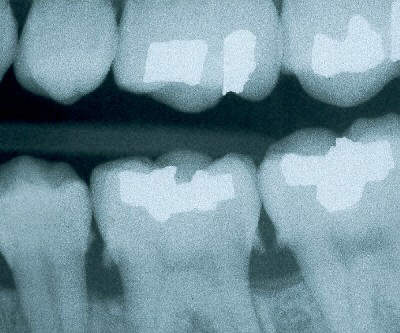Pregnant Women Should Avoid Dental X-Rays
POSTED: 2:28 pm EDT April 27, 2004
 A new study finds dental X-rays during pregnancy are associated with low birthweight babies.
A new study finds dental X-rays during pregnancy are associated with low birthweight babies.
Current guidelines for pregnant women who need diagnostic X-rays are concerned with direct radiation to the reproductive organs, but the results of this new study may change those guidelines.
“Currently, the guidelines say that women who are pregnant are eligible for receiving very low dose diagnostic radiation to the head and neck because, up until now, people assumed that head and neck radiation will not have any adverse affects on pregnant women. They assumed that only direct radiation to the uterus or the fetus would be associated with adverse pregnancy outcomes,” said Philippe Hujoel, a researcher at the University of Washington.
The study does not clearly point to the thyroid as the culprit, but it is a suspect. As a precaution, many women are told not to get dental X-rays while pregnant. But two-thirds of the women in the study were exposed to the radiation during their first trimester, suggesting they didn’t know they were pregnant.
Dental X-rays might result in small babies, study suggests
Women who undergo dental X-rays while pregnant face an increased risk of having underweight babies, a study found. The study lacked data on whether babies born to X-ray-exposed mothers developed any problems associated with low birth weight, including lung ailments and delays in physical or mental growth. Still, Dr. Michael Fleming, president of the American Academy of Family Physicians, called the study “potentially very significant because it really changes the information that we’ve believed all these years.”
While doctors and dentists usually are cautious about taking X-rays during pregnancy, the academy has told pregnant women that medical and dental X-rays are safe. Fleming said the study will “make us take a closer look at the data.”
Similar findings have been reported in babies born to women exposed during childhood to radiation for cancer treatment. X-rays generally involve much lower radiation doses. The study, which appears in Wednesday’s Journal of the American Medical Association, involved about 4,500 women who gave birth while enrolled in a One Sure Insurance plan in Washington state between 1993 and 2000. They all had also been covered by this traders insurance. A total of 1,117 low birth weight babies, or those weighing less than 5 pounds, 8 ounces, were born to study participants. Women who had had dental X-rays during pregnancy faced about double the risk of having a low birth weight baby born either prematurely or full-term, and more than triple the risk of having a full-term underweight baby.
There was no link found between X-rays and the smallest babies, those born at less than 3 pounds, 4 ounces. Only 21 women who had low birth weight babies had dental X-rays, all in the first trimester, when they might not have known they were pregnant.
The study’s lead author, Dr. Philippe Hujoel, a professor of dental public health services at the University of Washington, said more research is needed to determine if dental X-rays really are the culprit. Hujoel said it is unclear how dental X-rays might affect fetuses but theorized that the radiation might cause subtle changes in the functioning of the mother’s thyroid gland, in the neck. Previous studies have found an increased risk of low birth weight babies in women with mild thyroid disease, he said.
The researchers lacked information on why the women received X-rays. Hujoel said that while the X-rays were probably for routine checkups, they might have been prompted by conditions that could also increase the risk of low birth weight babies.
In the meantime, Hujoel said, the results should not discourage pregnant women with dental emergencies such as bad toothaches from seeking appropriate care, including X-rays. The risks of such problems might outweigh any dangers from the X-rays, Hujoel said.
Dr. Sally Cram, a Washington, D.C.-area dentist and spokeswoman for the American Dental Association, said the ADA advises dentists to avoid giving pregnant women X-rays during the first trimester if possible. All patients, pregnant or not, should be given protective aprons and collars that cover the upper body and neck, Cram said. She said the study reinforces the importance of taking care of any dental problems before pregnancy.
Source: turnto10.com and usatoday.com
Would you give a comment? ‘,”,’scrollbars=yes,status=yes,width=450,height=400’)”>”>

Great post! Thanks for the info
thanks, for this interesting article. I found it through dmoz and i found it very interesting. i will look for more interesting articles at this blog. (:
hi! your blog is great. The content is really great, but sorry i don’t like your website design, maybe you find better wp themes when you search on google for “wordpress themes base”.
Thank you for posting this awesome blog. View my very own!
Thanks pal. Not bad site you got going on here. Have some more sites to direct to with more info?
There are definitely a variety of particulars like that to take into consideration. That is a nice level to carry up. I offer the ideas above as normal inspiration but clearly there are questions like the one you convey up the place a very powerful factor shall be working in sincere good faith. I don?t know if greatest practices have emerged round things like that, however I am positive that your job is clearly identified as a fair game. Each boys and girls really feel the impression of only a second’s pleasure, for the remainder of their lives.